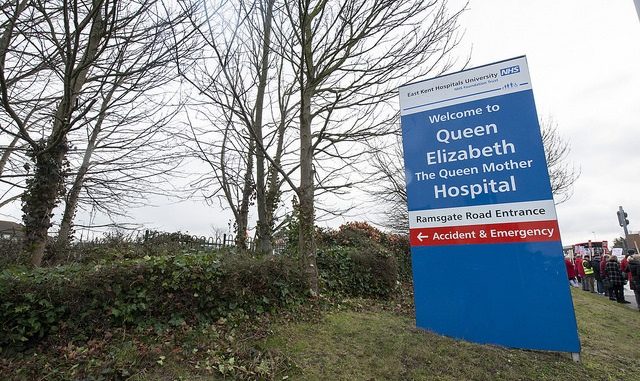
South Thanet MP Craig Mackinlay and County Councillor Karen Constantine are due to meet on Thursday (January 31) to discuss the imminent decision by health chiefs to close QEQM Hospital’s acute stroke service in favour of a hyper-acute unit in Ashford.
Hyper acute stroke units have a multi-disciplinary team of specialist stroke clinicians, seven days a week to care for people in the first 72 hours after a stroke.
A final decision on the location for three units across Kent & Medway is expected to be backed by the county council health scrutiny committee on February 1 and then confirmed by the Joint Committee of Clinical Commissioning Groups on February 14.
The proposed shortlist was announced at the start of last year. The preferred option was then confirmed in September as Darent Valley Hospital, Maidstone Hospital and William Harvey Hospital.
Reorganising the service
Darent Valley will have a 34 bed unit, Maidstone General Hospital will have 38 beds and William Harvey Hospital will have 52 beds. There will also be a two bed outflow at Eastbourne General Hospital.
There will be no acute stroke services at Medway Hospital, Tunbridge Wells Hospital, Margate’s Queen Elizabeth the Queen Mother Hospital and Kent & Canterbury Hospital – which has already had its service withdrawn due to the removal of training doctors by Health Education England in March 2017
The JCCG say there will be an increase in specialist stroke staff including an estimated 8.8 additional consultants, up to 107 additional nurses and 46 additional physiotherapists and occupational therapists.
It expects the hyper-acute units at Darent Valley and Maidstone to go live in March 2020 followed by the William Harvey Hospital in spring 2021.
Thanet campaign

But Thanet campaigners have been fighting the proposals, saying isle lives will be at risk because of the journey times to Ashford which can take more than one hour from Thanet.
Calls have been made by the Save Our NHS in Kent group for the Kent and Medway NHS to look at the proposals again to include a fourth HASU unit at the QEQM.
MP Craig Mackinlay has also called for a fourth unit at QEQM. Cllr Constantine is asking the MP to again raise the issue publicly and in Parliament.
She said: “Craig Mackinlay needs to step up and speak to his Government about the way in which the health and well being of his constituents will be compromised by the decision to remove the Ssroke service from QEQM.”
Mr Mackinlay said: “I want a four centre option which upgrades QEQM to include a hyper-acute stroke unit for Thanet and this continues to be my preferred outcome. Health ministers and, more importantly, the local NHS managers and clinicians advancing these proposed changes for stroke care are well aware of my longstanding preference as a result of our extensive discussions.
“As I have said all along, this is a decision for the professionals involved in our local NHS Trusts. I have heard the arguments first hand advanced by the relevant professionals and, while they do superficially pass scrutiny, I am not a qualified clinician. I continue to have reservations that Thanet can be adequately serviced for stroke care from Ashford but I have every confidence that they will continue to have the best interests of my South Thanet constituents at the centre of all that they do.”
JCCG report
But the report says East Kent Hospitals University NHS Foundation Trust (EKHUFT) concluded that it would not be possible to run two Hyper Acute Stroke Units because it would be very difficult to deliver due to recruitment issues and the risks around staff relocation. Of the sites run by the trust (QEQM, William Harvey and Canterbury), the William Harvey Hospital was identified as the best option for a hyper acute stroke unit
The JCCG stroke report says: “Some patients will have to travel further for the urgent aspects of their stroke care, with the maximum journey time being 63 minutes however, consolidating hospital stroke services will save lives and reduce disability.
“People from the most deprived quintile will be disproportionally impacted by the proposed changes in terms of travel and access, compared to the general population. However, the positive health impacts from the proposed changes, including improved clinical outcomes, are likely to also be experienced disproportionately by this group due to their higher likelihood to require stroke services.
“Therefore, the impact of increased travel times will be felt by visitors and carers who will need to travel further to visit patients, and mitigations are being developed to address this issue via a Travel Advisory Group.”
Funding
It is planned provide additional funding of £500,000 per year for the ambulance service which will ‘upskill’ paramedics.
The report adds that the units will reduce financial deficits in the Kent and Medway service, although a review of those finances will take place.
An estimated £13.6m was spent by CCGs on acute stroke activity in the Kent and Medway catchment area in 2016/17. Hospital stroke services are currently running at an estimated £7.5 million deficit. The new service would decrease that deficit by £0.5m
The cost to CCGs of implementing the new hospital stroke service model has been estimated at £3m per year :
- An estimated £1.7m, comprising the costs of re-training the work force, double running, excess travel and agency premium to continue services on those sites set to cease services.
- An estimated £1.6m costs for agency premium to continue services on those sites set to cease services.
- A proposed annual £0.5m (full year effect) increase in ambulance costs reflecting the impact of the increase in ambulance mileage.
- Plus a £3.3m for programme management costs to implement the changes and three years for the renting of a modular building in Dartford
These costs are in addition to a total capital investment of £27.7million
The JCCG also say current units are understaffed with QEQM having a shortfall of 4 specialist consultants
Stroke prevalence across the Kent and Medway CCGs is around the national average of 1.7% but In Thanet has the highest prevalence in the county at 2.1% followed by Canterbury at 1.9%. In Kent and Medway there were 3,146 confirmed strokes in 2016-17 with 372 of those logged in the Thanet area.
The decision meeting
The stroke services meeting on February 14 will be held at 2pm at the Hilton Hotel, Maidstone.
The JCCG meeting will be held in public so that people can attend to hear members discuss the decision-making business case and reach their final decision.
Places are limited and it is essential to register in advance at https://kmstroke-jcccg-14feb19.eventbrite.co.uk or by phoning 0300 7906796.
SONiK will hold a protest outside the meeting venue from 1pm.
Rehabilitation
As part of the review, health professionals in Kent and Medway say they are now designing new stroke rehabilitation services, including hubs.
Care will include rehabilitation therapy at home and in clinics as needed for up to six months; intensive rehabilitation at home three times a day, seven days a week; care in an inpatient rehabilitation unit for up to six months or care in a nursing or residential care home.
Kent and Medway NHS says the new approach to rehabilitation must happen at the same time as the implementation of hyper-acute stroke units. A rehabilitation business case will be presented to CCGs this Spring.
Mr Mackinlay has been asked for comment.

